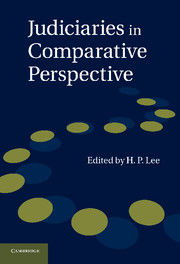Book contents
- Frontmatter
- Contents
- Contributors
- Foreword
- Preface
- Table of cases
- Table of statutes
- Part I
- Part II
- 2 Appointment, discipline and removal of judges in Australia
- 3 Appointment, discipline and removal of judges in Canada
- 4 Appointment, discipline and removal of judges in New Zealand
- 5 Appointment, discipline and removal of judges in South Africa
- 6 Appointment, discipline and removal of judges
- 7 Judicial selection, removal and discipline in the United States
- Part III
- Part IV
- Part V
- Part VI
- Index
- References
5 - Appointment, discipline and removal of judges in South Africa
from Part II
Published online by Cambridge University Press: 07 September 2011
- Frontmatter
- Contents
- Contributors
- Foreword
- Preface
- Table of cases
- Table of statutes
- Part I
- Part II
- 2 Appointment, discipline and removal of judges in Australia
- 3 Appointment, discipline and removal of judges in Canada
- 4 Appointment, discipline and removal of judges in New Zealand
- 5 Appointment, discipline and removal of judges in South Africa
- 6 Appointment, discipline and removal of judges
- 7 Judicial selection, removal and discipline in the United States
- Part III
- Part IV
- Part V
- Part VI
- Index
- References
Summary
Judicial politics has never been in the news in South Africa as much as it is currently. Scarcely a week passes without a newspaper billboard proclaiming the most recent pronouncement by a superior court judge. This shift in the focus of public life is a direct reflection of the elevation of the judiciary in the constitutional framework since 1994, consequent on the allocation to it of the power of judicial review of legislative action. So, from the establishment of the Constitutional Court (CC) in 1994, judgments dealing with highly contentious social issues or high-profile national figures have featured in news media, mostly indicating public approbation for the work done by the courts. Regrettably, however, the past seven years or so have witnessed particular judges or even courts being cast in an altogether less positive light generated by controversy surrounding the judicial appointments and disciplinary processes which have been in place since 1994.
The purpose of this chapter is to describe such events, setting them critically against the practices of the pre-democratic period in South Africa’s history and against the prevailing party political climate. As with every aspect of the ‘government’ of South African society, critical assessment needs to occur in such contexts, not unduly to celebrate successful innovation nor to seek excuses for lamentable shortcomings, but to emphasise properly the complexities of a society in transition. This is a process which necessitates substantial upheavals of established practices and expectations, in which there is a risk of the loss of what might have been conducive of good governance, in pursuit of systemic renewal and a greater degree of equity and justice. So this is a tale of both good and bad, of confusion and poor management in the face of uncharted territory, and of the constant tensions lingering from the wickedness of the past.
- Type
- Chapter
- Information
- Judiciaries in Comparative Perspective , pp. 96 - 116Publisher: Cambridge University PressPrint publication year: 2011
References
- 2
- Cited by



